Once the domain of 'squares', solving Rubik's cubes and similar puzzles is now a fast-growing sport
SINGAPORE — When 22-year-old Daryl Tan first picked up his hobby of solving the Rubik’s cube at age 12, he spent many hours training alone to beat his personal best time.
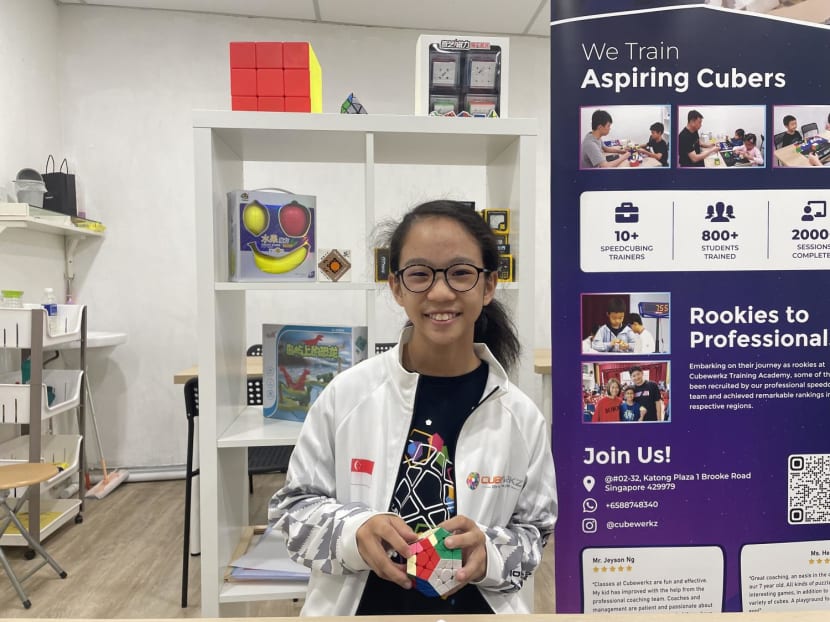
Beth Lee, 12, signed up for classes at Cubewerkz’s Cubing Academy after she and her parents chanced upon the store.
- Speed-solving a Rubik’s cube has grown in popularity in Singapore in the past four years
- There are more local competitions today and registrations for these even fill up within minutes at times
- Training centres have also been set up to help enthusiasts improve their timings
SINGAPORE — When 22-year-old Daryl Tan first picked up his hobby of solving the Rubik’s cube at age 12, he spent many hours training alone to beat his personal best time.
There were few competitions he could join to hone his skills, and even fewer friends who were interested in turning the hobby into something competitive.
Fast forward a decade and there are now more local competitions than the Rubik’s cube enthusiast can keep up with — he has taken part in four out of the 10 competitions held in Singapore this year so far.
The Singapore Institute of Technology physiotherapy undergraduate recalled how when he first started out there were only around one to three competitions a year.
Speedcubing, or solving Rubik’s puzzles against the clock, has rocketed to popularity of late – with even dedicated training centres popping up in the past three years, offering classes on how to go about it like a pro.
Even Singaporeans like Mr Tan, who are picking these cubes up without proper training, are doing well.
Mr Tan is a four-time Rubik’s Cube champion in Singapore and holds nine Guinness World Records international titles for events such as the fastest Rubik’s cube solve while juggling, and the most 3-by-3 Rubik’s cube one-handed solves in a single breath underwater.
And earlier this month, 20-year-old Singaporean Tristan Chua Yong was crowned world champion in the Megaminx category at the World Cube Association world championships, after he solved the 12-faceted puzzle in an average time of 29.25s.
He beat 313 other competitors worldwide to clinch the award.
REGISTRATIONS ‘FILL UP WITHIN MINUTES’
For long-time enthusiasts, the hobby’s growing popularity is palpable.
Mr Isaac Wong, 23, a Nanyang Technological University computer science undergraduate who picked up his first Rubik’s cube in 2008, said the most obvious sign that interest has picked up is that competitions now can fill up within minutes of registration opening.
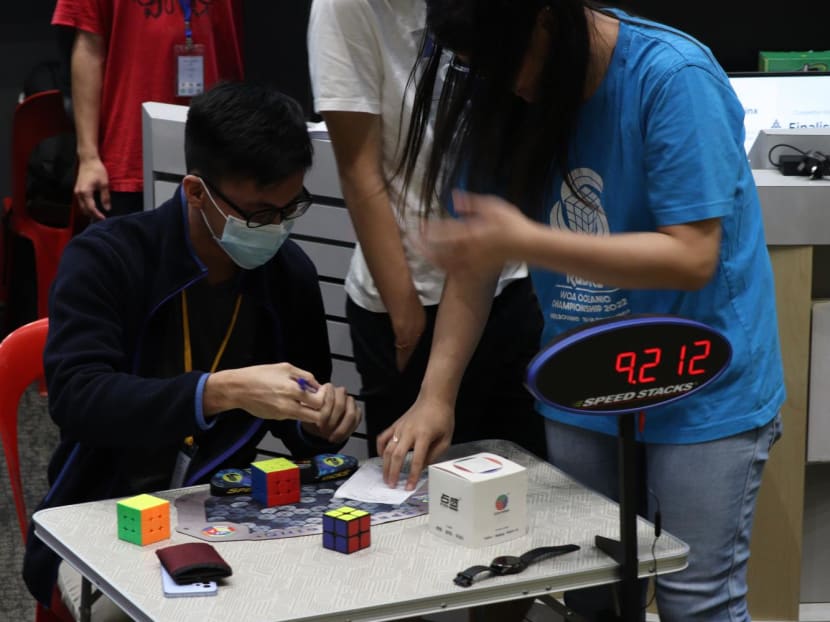
“Back in 2019, it still took a few weeks for the registration limit to be met,” said Mr Wong who has been speedsolving since 2012.
Other enthusiasts believe the rising popularity could be attributed in part to improvements in cube technology around 2019, with the popularisation of magnetic cubes that can be manipulated faster, and which allowed individuals to clock timings once thought unachievable.
In 2020, global streaming giant Netflix also released a documentary titled The Speed Cubers, which profiled two of the fastest speedcubers in the world then.
TRAINING CENTRES CATER TO RISE IN POPULARITY OF HOBBY
While cubing enthusiasts in the past had to pore over paper manuals or watch YouTube tutorials to improve their skills, there are now enrichment centres dedicated to the sport.
Cubewerkz Cubing Academy, which started as a retail brand in 2012, began offering classes at the end of 2020.
Its founder, Mr David Ang, said his company started conducting lessons at a tuition centre in 2016. It began offering private tutoring classes in 2018, and in the same year trained some of their students’ parents to run a competition in a primary school.
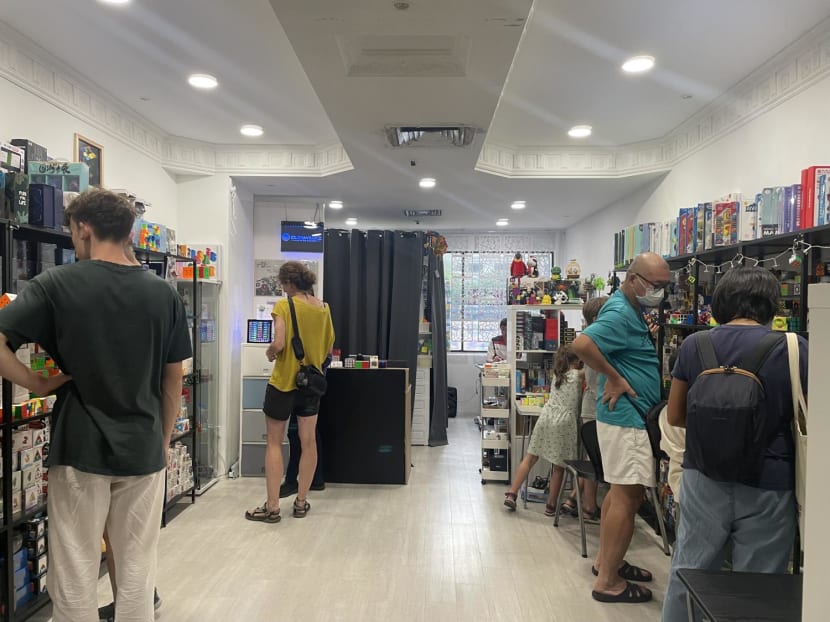
They then began to receive multiple requests to conduct trainings and organise competitions, which led to the company offering regular classes to plug the gap in the market.
A typical class revolves around learning algorithms to solve the puzzle, before these strategies are put into practice. The class is tailored to each student and could look like engaging in timed races against a coach, or being drilled on the algorithms they had learned.
More advanced students could focus on finger tricks, cutting down the moves required for a solve, and on smoothening their technique, students told TODAY
“This hobby (of cubing) can be started by anyone with a reasonable quality low budget speedcube.”
“Mastery requires spending countless hours in sharpening their skills by learning more sets of algorithms and executing them perfectly with less lockup and good look ahead. Speedcubing is about overcoming your own limits and reaching your full potential,” said Mr Ang.
Another academy, Mofunland, opened an outlet in Marina Square last year, before expanding to a second outlet in April.
The academy’s chief executive, Ms Vivian Xie, said they have coached more than 1,000 students in the past year.
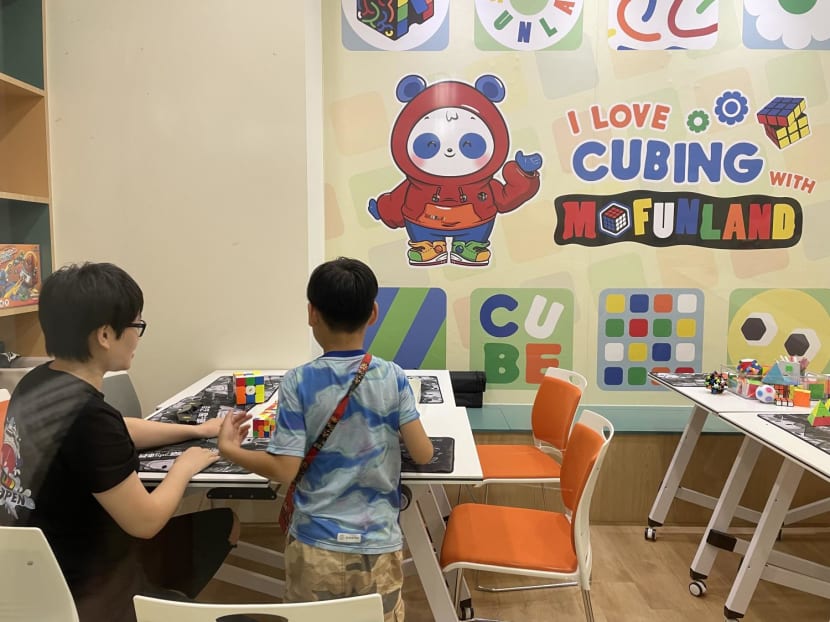
Ms Xie said that some students find that they are unable to solve the puzzle despite watching online tutorials, or struggle to improve their timings despite being able to solve the puzzle.
“They want to be faster but they can’t, because for the advanced method, there are many algorithms to learn and it’s also quite difficult to understand. An in-person coach, can better guide (students) on these finger tricks,” she said.
Primary 6 pupil Beth Lee, who started the hobby three years ago when she was bored during the Covid-19 lockdowns, initially honed her skills by watching Youtube tutorials or asking her mother for help.
Ten months later she signed up for classes at Cubewerkz’s Cubing Academy after she and her parents chanced upon the store.
Today, she solves a three-by-three Rubik’s cube in an average of 10 seconds, compared to the 22-second average she used to clock prior to starting classes.
“I’m less of a ‘compete against-someone-else’ (and) more like a ‘compete-against-myself’, ‘try to improve my own timings’ (kind of person),” Beth told TODAY.
Mr Leon Neo, who was curious about cubing, started watching online tutorials when his eight-year-old son Gabriel started his lessons at Cubewerkz.
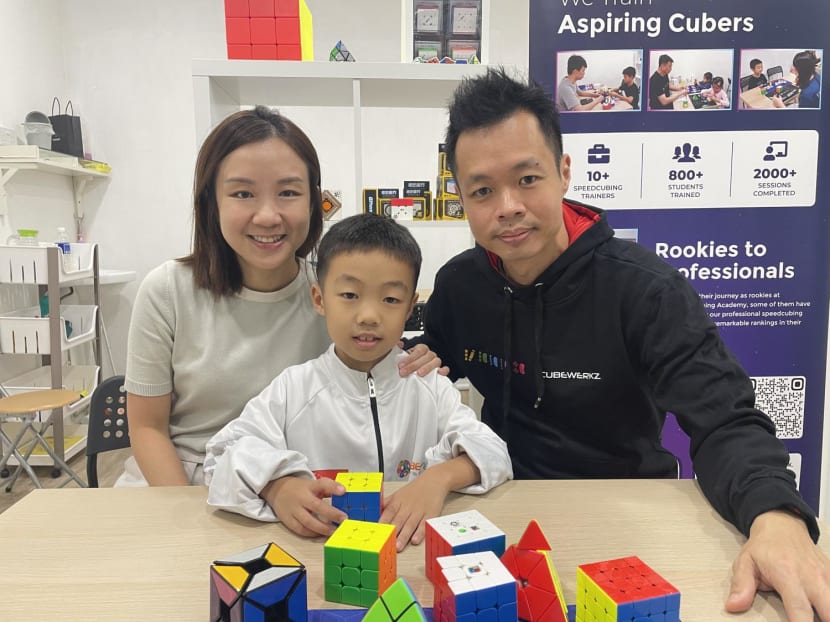
His son picked up the hobby two years earlier after watching the Netflix documentary and “finding it cool”.
“I realised the classes are much better, because the trainers have digested all of the YouTube content, and they really present it very well,” he said.
LESS SCREEN TIME, MORE DISCIPLINE
Parents TODAY spoke to also lauded the benefits of the hobby which has helped to keep their children off digital devices and screen time, and inculcate values such as discipline, perseverance, and concentration.
Beth’s father, who wanted to only be known as Mr Lee, said that Beth and her sister used to spend their free time watching the television and that has lessened since she started finding enjoyment in speedcubing.
Mr Lee also saw the sport’s value in developing perseverance and stress management. He added that cubing can mimic a “real life situation”, where perseverance comes into play when one is faced with a difficult problem in school or at work.
Ms Joanna Foo, whose 11-year-old son Jaden picked up the hobby in 2020 before starting classes in 2021, said that he became more self-disciplined and could concentrate for longer as a result of his interest in cubing.
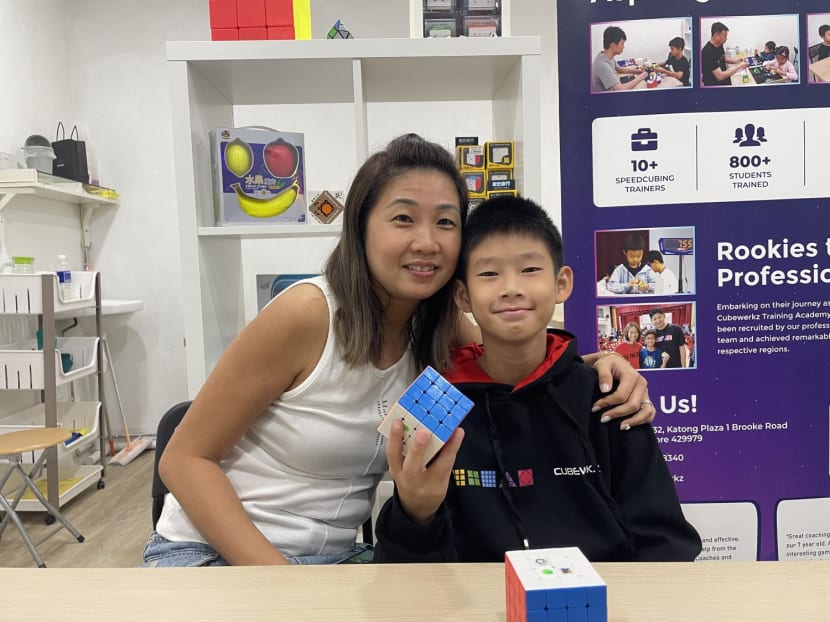
For Mr Wong, who mainly relied on YouTube videos, self-practice, and the occasional exchange of techniques with friends when he picked up cubing more than a decade ago, training centres were “quite unheard of”. Mr Wong is now a part-time trainer at Mofundland’s cubing academy.
He said that such academies help to speed up the improvement of newcomers and up-and-coming talents, and can help the community to grow.
Another major benefit of this growth is that the cubing community would be more visible to the public.
“If anything, it simply feels great knowing that the sport I love and have poured so much time into is getting its well-deserved recognition,” he said.











